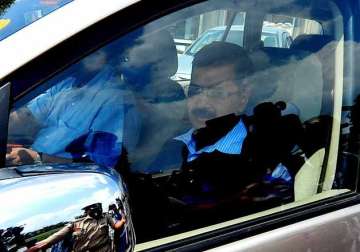Crisis shows AAP, Arvind Kejriwal in poor light
There are no winners in the ugly spat that was in full play at the AAP leadership meet which saw the exit of Prashant Bhushan and Yogendra Yadav from the Political Affairs Committee (PAC), the

There are no winners in the ugly spat that was in full play at the AAP leadership meet which saw the exit of Prashant Bhushan and Yogendra Yadav from the Political Affairs Committee (PAC), the party's highest decision making body. But there is one sure loser: the Aam Aadmi Party.
Although Bhushan and Yadav got ousted through a democratic process, the AAP has only hurt itself by dismissing the services of the two men from a body that takes the final call on its policies. The revelation by Mayank Gandhi, another AAP leader, on how this happened only exposes that all is not well with India's youngest political party.
And it is a shame that the AAP was embroiled in an internecine war of this kind so soon after it won a spectacular victory in Delhi.
One question that cropped up amid the crisis is if the AAP is Arvind Kejriwal centric. The honest answer is yes, whether one likes Kejriwal or not. The fact is the AAP and Kejriwal are today synonymous. This is unlikely to change in the immediate future.
This has generated a problem.
Kejriwal loyalists (there are many) feel that Delhi's chief minister - who certainly deserves the major credit for rejuvenating a party that was in the dumps a year ago - must have the last word on all major issues.
Not everyone in the AAP feels the same way.
Although they lack Kejriwal's mass charisma, Yadav and Bhushan are no ordinary people. Yadav is one of India's best political minds and Bhushan is, apart from being a leading Supreme Court lawyer, one of the founders of AAP - along with his lawyer-father Shanti Bhushan. Both Yadav and Prashant Bhushan are also widely respected among the rank and file in the party.
A section of the AAP had major issues with Yadav, who was accused of leaking to the media issues within the party. Yadav, for instance, wanted the AAP to contest the assembly election in Haryana while Kejriwal was bitterly opposed to this. Yadav also raised objections about some AAP candidates in Delhi, citing various reasons, something Kejriwal did not like. There were other matters too.
Prashant Bhushan's case was different. Apart from throwing his lot with Yadav on some aspects, his father publicly criticized the AAP and Kejriwal ahead of Delhi's election. It is not clear why he did this at a time when the AAP was locked in a make-or-break battle with the BJP.
But the manner in which Bhushan and Yadav were booted out of the PAC on Wednesday evening has not gone down well with the mass of AAP activists. Kejriwal may not have attended the National Executive meeting saying he was "deeply hurt and pained" by the internal crisis but he clearly failed to prevent what happened to Bhushan and Yadav.
If Mayank Gandhi is to be believed, Bhushan and Yadav were willing to step down from the PAC in a honourable manner but were forcibly ejected. Was this necessary? Could this have happened without Kejriwal's approval?
AAP leaders who took to Twitter to hit out at Yadav and Bhushan ahead of the Wednesday meeting have demeaned the party that claimed to uphold a different set of political values. If Yadav and Bhushan are guilty of discussing party affairs publicly, then Kejriwal supporters too must be charged with the same crime.
Bhushan and Yadav may have lost membership of the PAC but not their stature. If Kejriwal is ready to consult Kiran Bedi and Ajay Maken - who are no AAP lovers -- on Delhi's affairs, then he must show greater respect to the two men ousted from the PAC. Otherwise, this will be seen as a drama that Kejriwal masterminded, notwithstanding his public criticism of the episode. The AAP will then be seen as just another political party.